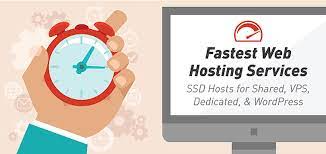About fastest web hosting
you tired of wait for your website to load? Do you want to provide the best user experience for your visitors? Look no further than the world of web hosting! Choosing the right web hosting provider can make all the difference in how quickly and efficiently your website loads. In this article, we will explore everything you need to know about fastest web hosting, from defining it to tips on increasing your website’s speed. So buckle up and get ready to take your website’s performance to new heights!
Defining
When it comes to web hosting, the term “fastest” can mean different things to different people. However, at it core, fastest web host refers to a type of hosting that designed for speed and efficiency. This means that the servers used by these providers optimized to deliver content quickly and reliably.
One important distinction between different types of web hosting whether they shared or dedicated. Shared hosting involves multiple websites sharing resources on one server, which can lead to slower load times during periods of high traffic. On the other hand, dedicated hosting provides a single website with access to an entire server’s worth of resources.
Another factor in determining the speed of your website is its design. Large files like images and videos can slow down load times if they properly optimized for the web. Additionally, using too many plugins or widgets can also bog down your site’s performance.
Ultimately, choosing a fastest web hosting provider requires careful consideration of various factors like server location, uptime guarantees, and customer support options. Keep these tips in mind as you explore your options and find the right provider for your needs!
Different types of web hosting
When it comes to web hosting, there are several types that you can choose from based on the needs of your website. The most popular type shared hosting where multiple websites share a single server and its resources.
Another type of web hosting is VPS (Virtual Private Server) hosting which provides more control over your website’s resources as you have access to a portion of the server just for yourself. This means that your website will run faster compared to shared hosting.
For websites with high traffic or complex applications, dedicated server hosting may be necessary. With this option, you have complete control over the entire server, allowing for maximum performance and customization.
Cloud hosting is another alternative where instead of relying on a single physical server, your website runs across multiple servers in different locations. This ensures better uptime and scalability since resources can easily added or removed as needed.
Ultimately, the choice between these different types of web hosting depends on what works best for your specific business needs and budget.
-shared
Shared hosting is one of the most common types of web hosting available out there. This type of hosting involves sharing a server with other websites. This means that you not the only website on the server, and resources such as CPU usage, RAM, and disk space shared among all users.
While shared hosting may be an affordable option for beginners or small businesses just starting out online, it does have its downsides. One of which that your website’s speed can affected if other websites on your server receive high traffic or use up too many resources.
Additionally, because you share a server with others, security risks also increase. Another site on the same server gets hack or experiences a cyber attack, it could potentially affect your own website as well.
While shared hosting may seem like a cost-effective solution at first glance, it’s important to weigh the pros and cons before making a decision.
How to increase your website’s speed
Having a fast-loading website is crucial for retaining visitors and improving search engine rankings. Here are some tips you can follow to increase your website’s speed.
First, optimize your images by compressing them without sacrificing quality. Large image files slow down website loading times significantly, so using an optimization tool like TinyPNG can help reduce file sizes without compromising on visual quality.
Secondly, minimize the number of plugins and scripts that run on your site as they also add extra load time. Only use essential tools and get rid of those that aren’t necessary.
Thirdly, enable browser caching which helps to store parts of your site temporarily in a user’s browser cache memory after their first visit. This means when they return to the same page again, it will load faster because some data has already been stored in their cache memory.
Consider upgrading to a faster web hosting plan or switching hosts altogether if necessary. A high-speed web host ensures quick delivery of content from server to user’s device – which translates into speedy browsing experience for users visiting your site!
Conclusion
To sum up, having a fast web hosting is crucial for the success of your website. It can affect not only your site’s user experience but also its search engine rankings. When choosing a web host, always consider the different types of hosting available and their respective speed capabilities.
Shared hosting may be affordable, but it may compromise your site’s loading time due to resource sharing with other websites. On the other hand, VPS and dedicated servers give you more control over. Server resources and can greatly improve your website’s speed.
Aside from choosing the right type of hosting service, there are also several ways to optimize your website’s performance. These include optimizing images, minimizing HTTP requests, reducing file sizes, and leveraging browser caching.
So take some time to evaluate what kind of hosting solution would best suit your needs before making. Any final decisions about which provider or plan makes sense for you!

